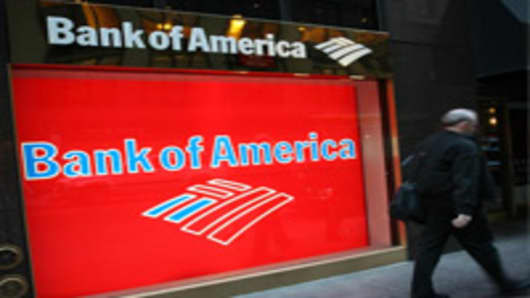As it turns out, consumer protection will mean more banking fees for most consumers.
Bank of America, the nation’s largest bank by deposits, announced its third quarter earnings today. In the earnings presentation, Bank of America said it was moving away from penalty fees charged to those who over-draw debit card and checking accounts. It is replacing those fees, which hit only a fraction of the bank’s customers, with monthly fees that will hit most of Bank of America’s customers.
Welcome to the new world of regulated banking: lower fees for some, higher fees for most.
This probably is not what most people imagined when they heard that financial reform would include consumer finance protection. Nearly everyone hates being charged banking fees—and I’d venture to say many imagined that consumer finance protection would lower the fees they paid. Instead, the fees are going up.
The argument for the new fee structure is, in part, based on a version of fairness. Just ten percent of Bank of America’s customers were paying some 70% of the overdraft fees. These were often people with the lowest levels of financial intelligence and in far more precarious financial positions. Relieving the burden of fees from this group and spreading the fees around is almost Rawlsian or egalitarian banking, benefiting the least well-off at the expense of the better informed and more prudent.
For some, however, the new fees will seem unfair. The old structure rewarded the most responsible bank customers with things like free checking, free debit cards, and lower fees for most of their banking activities. Those rewards are going away, thanks in large part to the new consumer protection regime. The nanny state is costing most of Bank of America’s customers real money.
This shouldn’t really come as a surprise. There is not really such thing as “free checking.” Bank of America bears costs to provide banking services to customers and has a duty to return value to shareholders. It has to seek income and profits for these activities. The fees were never going to go away: they were just going to be redistributed.
Bank of America is not spinning this as a result of regulations. While chief executive Brian Moynihan acknowledged that regulations played a part in the decision to restructure the fees, he played it up as a sound business decision.
“We made a business decision,” Moynihan said on an analyst call this morning. “We found that customer reaction to the fees was hurting our franchise and long-term would hurt our shareholders.”
According to Moynihan complaints about the fees were at an all time high. Since the new fee structure began kicking in, complaints about unexpected fees have decreased.
Moynihan said that Bank of America has stopped unintentional small debit overcharge fee. This means that the infamous fees that could transform a $3 cup of coffee into a $40 cup of coffee—because the customer paid with a debit card on an overdrawn account—should be a thing of the past.
At the same time, Moynihan said it would continue to allow customers to overdraw accounts at ATMs, providing they explicitly agree to the fee at the point of the transaction. This seems like a decent compromise between providing customers with flexibility to access cash when they are strapped and protecting customers from unintentionally getting hit with overdraw fees.
“Customers can make the choice,” Moynihan said.
But regardless of how Bank of America is spinning this as something being done to protect their customer base, the bank does view this as “mitigating impacts of regulatory reform.” They just don’t want to scare off investors who might fear that the regulatory changes will badly hurt profits in retail banking. The message Bank of America wants to send is that it can still make money without charging punitive fees.
Questions? Comments? Email us atNetNet@cnbc.com
Follow John on Twitter @ twitter.com/Carney
Follow NetNet on Twitter @ twitter.com/CNBCnetnet
Facebook us @ www.facebook.com/NetNetCNBC



